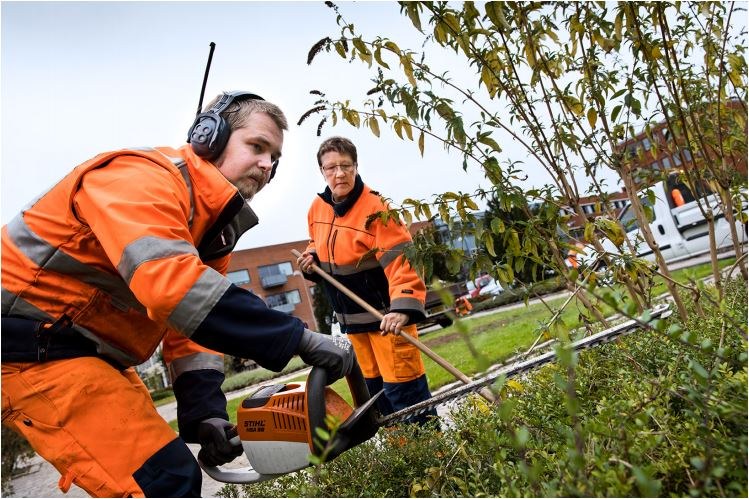Many municipal workplaces take on a great social responsibility by including people from the fringes of the labour market – for instance refugees and people suffering from psychological or physical ill health which prevents them from working under normal working conditions.
The parties in the municipal labour market believe that this task will become bigger in the years to come, and that it can only be a success if management and employees work closely together. Over the past 18 months they have cooperated to exchange good experiences from municipal workplaces which are including unemployed people according to the social chapter – i.e. using employment contracts with state support, which are covered by framework agreements between the social partners to secure such jobs do not impact on ordinary jobs.
As part of this cooperation, a range of municipal workplaces have shared their experiences. Workers who have been included, their colleagues and the workplace itself see the benefit of the inclusion. The experiences have been recorded partly in a new report, and partly in a number of articles on the online portal Viden på Tværs, easily accessible for anyone who works with inclusion.
A meaningful task
The report is called ‘Rummelighed i praksis’ (Flexibility in practise), and was written by researchers at the Danish National Centre for Social Research, SFI, on commission from the main organisations in the municipal labour market, Local Government Denmark (KL) and the Danish Association of Local Government Employees Organisations (Forhandlingsfællesskabet).
This is the first report to take a closer look at the practical steps management and employees in municipalities are taking to create good inclusion programmes for people though for instance traineeships, wage subsidised jobs and flexjobs.
The report, published in the spring of 2017, identifies a range of formal frameworks which must be in place in order to create good inclusion programmes in municipal workplaces. It also points to the flexibility which is present in workplaces where everyone experiences that this gives meaning – both the municipality, the individual workplace and the person who is being included.
The report looks at three municipalities. In all three, the inclusion programmes are based in a narrative within top management which focuses on why the municipal workplaces should take responsibility for including people on the fringes of the labour market; namely that it is a joint responsibility to make inclusion work, and that the whole of the municipality wins when inclusion is a success – be it tax payers, users, employees or the people who are included.
Both management and employees in the municipalities concerned feel it gives meaning to spend resources on helping people on the fringes of the labour market get a foot in the door. Their experiences are summed up like this:
“Management and employees feel they are allowed to draw on their strengths and talents through the inclusion programmes. Watching a human being grow adds great human value, and as a result they feel they can contribute to giving another person a second chance. A good program also safeguards the core working task, which is felt as a relief during the daily work. Finally, they experience that the inclusion programmes contribute to the community spirit or the workplace culture, making the community itself more comfortable.”
Leadership and cooperation is needed
The report also shows that three main preconditions need to be in place in order to achieve an inclusion programme which is meaningful in the individual workplaces:
- Responsible management which takes the lead in the work with inclusion
- A high degree of trust and cooperation between management, union representatives and employees
- A running discussion about the workplace’s core task and how the person who is being included is linked to this
It is not an easy task. In the report, management and employees point to a range of typical challenges linked to inclusion programmes:
- If the workplace lacks resources, it can be difficult to maintain the support for inclusion programmes
- In certain areas it can be a challenge to find working tasks for people who lack relevant training
- It can be difficult to handle people with social or psychological problems in workplaces which have no professional social expertise
- Inclusion programmes which last only a few weeks often turn into a burden rather than a help
Everyone on board
Danish municipalities have quotas for how many unemployed people municipal workplaces should take in. Top negotiators in the municipal sector predict it will become even more important for municipalities to strive towards giving everyone a foothold in the labour market, and a chance to develop their skills.
“Working towards giving everyone a foothold in the labour market and a chance to develop their skills will become an increasingly important municipal responsibility in a time when jobs are disappearing, and many jobs are becoming more complicated. This means the municipal labour market must show considerable flexibility. The municipalities need to be at the forefront with this task,” said Michael Ziegler, head of KL’s salary and personnel commission during the launch of the SFI report.

The report shows that municipalities are doing the brunt of the work today: Unemployed people who are closest to the labour market are generally given wage subsidised jobs, traineeships and flexjobs in private companies – because the chance of securing permanent employment is better in the private sector, and because that group is the easiest to integrate.
The municipalities’ own workplaces welcome many people who also struggle with other issues besides unemployment, and for whom an inclusion programme often is nothing but a small step on the ladder towards normal employment.
Municipal work places which shoulder a lot of the inclusion work are typically health centres, transport and park authorities and child minding services – often because they often can offer working tasks for which no particular training is necessary.
But the municipalities cannot carry the most difficult inclusion tasks alone, point out the top negotiators in the municipal sector. The rest of the labour market and society as a whole need to provide more backing. The President of the Danish Association of Local Government Employees Organisations, Anders Bondo Christensen, put it this way:
“We must call for more shoulders to share the burden. Luckily there are private companies which have realised the value of social responsibility; if not out of pure idealism, then because it is good for business. The fact that Denmark time and again is held up as a place worth investing in, despite high levels of tax, stems from the fact that we are a safe society with room for all.”





